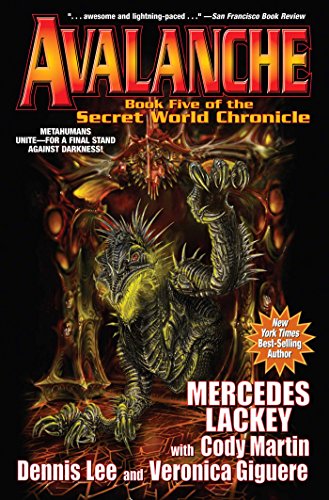About this item
From New York Times best-seller and science fiction and fantasy mistress of adventure Mercedes Lackey, Book #5 in the pulse-pounding SECRET WORLD saga of modern-day humans with superpowers.Ultima Thule has been destroyed - but somehow the Thulians mounted an even bigger force to destroy Metis. The Metisians that escaped the carnage and destruction of their secret city now must somehow find somewhere safe to go - without getting snapped up by various world governments. And now the Thulians have changed their tactics to "blitz guerilla warfar," sending wave after wave of their ships and troops to attack vulnerable targets all over Earth, with no clue for ECHO as to where these things are coming from. John Murdock and The Seraphym have become a force of nature, but they can't be everywhere at once, and if they were regarded with suspicion before, now they are regarded by ECHO's allies with fear as well. You could say "things can't get worse." You would be wrong. Red Djinni's past is about to catch up with him. So is Victoria Victrix's. The heroes of ECHO and CCCP have to save the world. But first, they have to save each other. And the avalanche has begun. About World Divided, Book 2 in the Secret World Chronicle: "[C]omes together seamlessly. . .an awesome and lightning-paced story: read it on a day when you will not have to put it down."-San Francisco Book Review About Mercedes Lackey: "With [Mercedes Lackey], suspense never lags..." -Kliatt The Secret World Chronicle Invasion World Divided Revolution Collision
About the Author
Mercedes Lackey
Mercedes entered this world on June 24, 1950, in Chicago, had a normal childhood and graduated from Purdue University in 1972. During the late 70's she worked as an artist's model and then went into the computer programming field, ending up with American Airlines in Tulsa, Oklahoma. In addition to her fantasy writing, she has written lyrics for and recorded nearly fifty songs for Firebird Arts & Music, a small recording company specializing in science fiction folk music. "I'm a storyteller; that's what I see as 'my job'. My stories come out of my characters; how those characters would react to the given situation. Maybe that's why I get letters from readers as young as thirteen and as old as sixty-odd. One of the reasons I write song lyrics is because I see songs as a kind of 'story pill' -- they reduce a story to the barest essentials or encapsulate a particular crucial moment in time. I frequently will write a lyric when I am attempting to get to the heart of a crucial scene; I find that when I have done so, the scene has become absolutely clear in my mind, and I can write exactly what I wanted to say. Another reason is because of the kind of novels I am writing: that is, fantasy, set in an other-world semi-medieval atmosphere. Music is very important to medieval peoples; bards are the chief newsbringers. When I write the 'folk music' of these peoples, I am enriching my whole world, whether I actually use the song in the text or not. "I began writing out of boredom; I continue out of addiction. I can't 'not' write, and as a result I have no social life! I began writing fantasy because I love it, but I try to construct my fantasy worlds with all the care of a 'high-tech' science fiction writer. I apply the principle of TANSTAAFL ['There ain't no such thing as free lunch', credited to Robert Heinlein) to magic, for instance; in my worlds, magic is paid for, and the cost to the magician is frequently a high one. I try to keep my world as solid and real as possible; people deal with stubborn pumps, bugs in the porridge, and love-lives that refuse to become untangled, right along with invading armies and evil magicians. And I try to make all of my characters, even the 'evil magicians,' something more than flat stereotypes. Even evil magicians get up in the night and look for cookies, sometimes. "I suppose that in everything I write I try to expound the creed I gave my character Diana Tregarde in "There's no such thing as 'one, true way'; the only answers worth having are the ones you find for yourself; leave the world better than you found it. Love, freedom, and the chance to do some good -- they're the things worth living and dying for, and if you aren't willing to die for the things worth living for, you might as well turn in your membership in the human race." Also writes as
Report incorrect product information.


